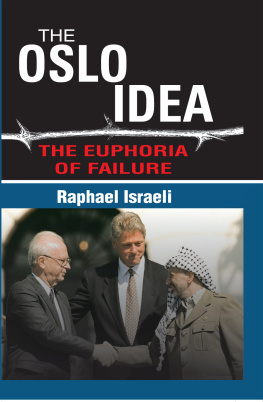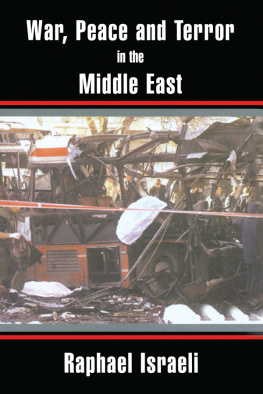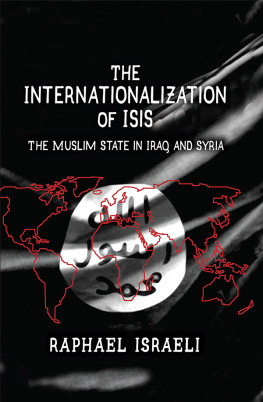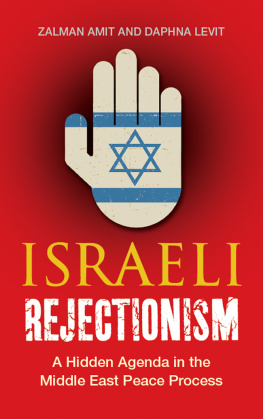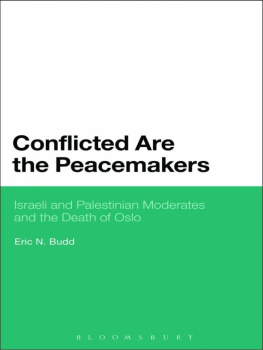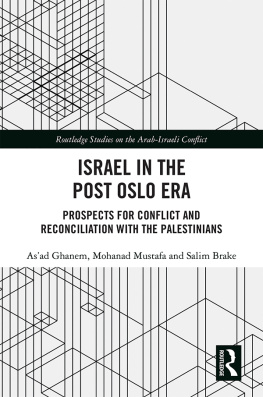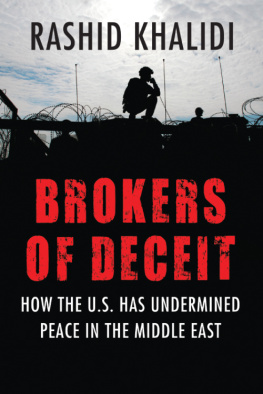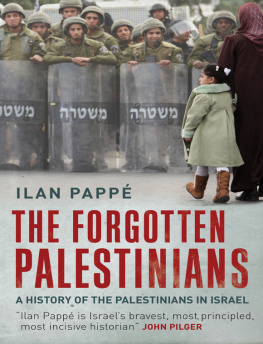First published 2012 by Transaction Publishers
Published 2017 by Routledge
2 Park Square, Milton Park, Abingdon, Oxon OX14 4RN
711 Third Avenue, New York, NY 10017, USA
Routledge is an imprint of the Taylor & Francis Group, an informa business
Copyright 2012 by Taylor & Francis.
All rights reserved. No part of this book may be reprinted or reproduced or utilised in any form or by any electronic, mechanical, or other means, now known or hereafter invented, including photocopying and recording, or in any information storage or retrieval system, without permission in writing from the publishers.
Notice:
Product or corporate names may be trademarks or registered trademarks, and are used only for identification and explanation without intent to infringe.
Library of Congress Catalog Number: 2011028785
Library of Congress Cataloging-in-Publication Data
Israeli, Raphael.
The Oslo idea : the euphoria of failure / Raphael Israeli.
p. cm.
Includes bibliographical references and index.
ISBN 978-1-4128-4611-0
1. Arab-Israeli conflict1993Peace. 2. IsraelPolitics and
government1993- 3. Palestinian ArabsPolitics and government
1993- 4. Israel. Treaties, etc. Munazzamat al-Tahrir al-Filastiniyah,
1993 Sept. 13. I. Title.
DS119.7.I82665 2012
956.94054dc23
2011028785
ISBN 13: 978-1-4128-4611-0 (hbk)
Apologia and Acknowledgments
This volume is the fruit of many lectures, discussions, and seminars over the Oslo years (19932010), with colleagues and students, in Israel and abroad, in which the prevailing question was: what happened to the Oslo idea? Or, what happened to the euphoria of 1993, when most minds in Israel and many in the world were worked up to believe that a messianic breakthrough was achieved whereby two implacable enemies, Israel and the PLO, were brought to terms, were made to reconcile, and the hitherto unthinkable peace prospect in the bellicose Middle East was suddenly made feasible. Those who doubted the Oslo process, who posed questions as to its validity, were treated as skeptics, spoilers, and cynics, who could not discern the pangs of the Messiah who was knocking at our door, and were bent on spoiling the party in which nearly everyone, in Israel and abroad, partook.
Seventeen years after, it is the latter few who turn out to have seen clearly the picture, were not blinded by the glamor of the moment, and detected the PLOs Yasser Arafats machinations, which from the start did not provide any chance for the process to succeed. Worse, seventeen years later, Israel has been facing one of the worst world campaigns of delegitimation and demonization, due precisely to the enormous scope of concessions and compromises it made in the process, which in one stroke have punctured all its firm and principled points of resistance over the years, when it had refused to budge in its contact with the Palestinians, and raised much resentment around the world. Ironically, from details that have been emerging after Rabins tragic death, it was in his time that principles were held firm: no Palestinian state, no division of Jerusalem, no wholesale Israeli retreat, no cessation of Israeli settlement; while his more lenient successor Barak, and more so his eager-to-please rival, Netanyahu, inaugurated the process of concessions and compromises which eroded Rabins principles and precipitated Israel into the impasse she finds herself in.
Many Israeli intellectuals and politicians have of their own hands persuaded themselves and the world, after 1967, that the problem in the Middle East was no longer between the many, more numerous, authoritarian and wealthier Arabs and tiny, democratic, and embattled Israel, where the latter deserved, and received, the support of Western like-minded societies. Nor did they understand that the dispute had grown in the past decades into a struggle between radical Islam (represented by revolutionary Iran and its clients) and the Jewish state. Those leftist self-denying liberals have constructed a world of fantasy which found them amenable to reduce the large equation of the conflict from ArabIsraeli and IslamicJewish, into the more manageable IsraeliPalestinian small equation, where suddenly things became simple: Israel is the colonialist occupier, the Palestinians are stateless and occupied, and Israel must be made to liberate those poor occupied victims from her colonialist expansion and aggression in order for peace to reign in the Middle East. Never mind the persistent threats against Israel from the Arab and Muslim outer circles, and from the waves of Palestinian terrorism which they launched against Israeli citizens as they were talking peace in Oslo.
But it turned out that even the peace treaties Israel signed with Egypt in 1979, and then Jordan in 1994, have failed to facilitate any settlement between Israel and the Palestinians. Quite the contrary. Since the Palestinians replaced Israel in attracting the sympathy of the Western world in the context of the small equation of the conflict, and since they pictured themselves as the helpless underdogs, given to the mercy of aggressive Zionism, their adopted new strategy of asymmetrical war, the strategy of the weak, where their terrorism and attacks against Israel would always win the attribute of resistance, and their helpless and innocent civilians and children would always earn the favor of the international media against the tanks of the powerful Israelis, the latter have been systematically condemned and denied a right of defense against terrorism, flotillas, and campaigns of smear and libel for murdering children (al-Dura affair), harvesting organs from Palestinians to trade with them (the Swedish Bostrum affair), war crimes (Goldstone), and plain blood libels, all subsumed under the neutral terminology of lawfare which replaced warfare.
The idea of peace is always enchanting to the mind, for it encompasses the tranquility and serenity that every human wishes for himself and to bequeath to his posterity. Especially in Israel, which has never known peace and tranquility since its inception, and even before, the hope for peace has become part and parcel of its collective dream. But in practice it learned that between the two poles of war and peace, there have always been middle-of the-road situations like cease-fire, truce, armistice, and other temporary cessations of hostilities, which also permitted the development of territorial concepts not known elsewhere. Indeed, in normal international relations, there are borders between nations, usually, or ideally, running along topographical features which delineate them like rivers, ridges, lakes, etc., and with natural areas of separation like inaccessible mountain ranges, torrid deserts, or lush forests. In Israel, the territory being tiny and restricted (20,000 sq. km in total), that is half of Belgium or Switzerland, or twenty-five times smaller than France, there is no possibility of building borders around such features (save for the vast Sinai desert on its border with Egypt). Security was then defined by no mans lands, demilitarized zones, or areas between the lines. As a result of the 1967 War in the Middle East, the notion of occupied territories was added, which in the absence of peace provided some of those requirements of security. Sinai is twice the size of all Israel and was evacuated when the peace was signed between Israel and Egypt in 1979. But small slivers of land on the Golan, in the Gaza Strip and in the West Bank, which together are not amounting to half the area of tiny Israel, have been at the focus of peace- or war-making between Israel and its neighbors since.

